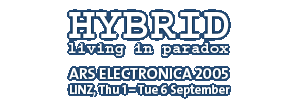The launch of the Ludwig Boltzmann Institute for Digital Culture and Media Science is being marked with a conference at which internationally renowned experts will address the tasks on the institute's agenda and the issues associated with them.
The new Ludwig Boltzmann Institute for Digital Culture and Media Science is being established in Linz to perform innovative research on the development of strategies for the documentation, description and preservation of digital artworks and media art. Specifically, the Institute’s mission is to archive and perform scholarly work on the digital artworks that make up the extensive Ars Electronica Archive. Consolidating scientific, artistic, technological and public mediation activities under the aegis of a single facility is designed to enhance the process of encountering digital art. Linz’s Art University, Ars Electronica Center and Lentos Museum of Modern Art and the Ludwig Boltzmann Society—leading institutions in their respective fields—anchor the partner consortium. The project, which has been initially approved to run for seven years, will be collaborating with numerous partner institutions worldwide.
The LBI for Digital Culture and Media Science seeks to tightly integrate scholarly research and its application-oriented use. The upshot of this approach is a tripartite agenda: a) scholarly description of digital artworks within the context of art history, b) archiving and conserving these works, and facilitating access to them, and c) developing computer-based tools to process and utilize the material in a wide range of cultural settings and scholarly pursuits.
The Ars Electronica Archive has been documenting outstanding examples of electronic art and design since 1979. Prominent scientists, artists and computer pioneers including Marvin Minsky, Jean Baudrillard, Nam June Paik, Paul Virilio and John Lasseter have been among the featured guests at this world-renowned festival of art, technology and society over the past 25 years, and have left behind traces of their activities in this archive.
With: Dieter Daniels (HGB Leipzig, DE), Alain Dépocas (Langlois Foundation, CA), Gerhard Dirmoser (AT), Monika Fleischmann (Fraunhofer Institut, Medienkommunikation, DE), Oliver Grau (Humboldt University Berlin, DE), Matt Locke (BBC, UK), Paul Leitner (Sony, AT), Rudolf Frieling (ZKM, DE)
 back
back

